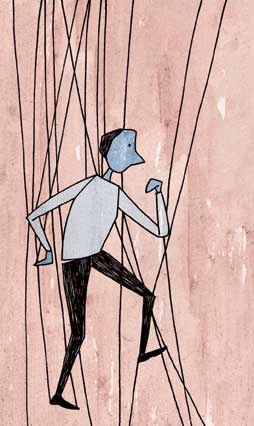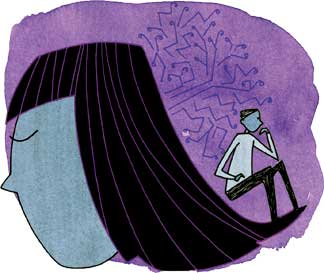Prakash Iyer
She will be offended if I share a different lesson plan. Her class plans always centre on debates and discussions, so that children get to engage in nuanced discussions similar to experts in a discipline. I do that most of the time too, but I want to try to organize my class in a way that children experience the discipline individually. Ira will not disagree. She will say that I should go with my lesson plan. In such situations her expression becomes calm and composed – almost non-committal. As if she is thinking, “Why do you ask me? It is your class, do what you want to do.”
But that makes me uncomfortable with my decision. She stops arguing and then I have to continue and argue with myself. Her reaction communicates that she has said all that she wanted to say; and it is up to me to decide. Sometimes she even changes the topic abruptly.
I want to try different pedagogical methods, and not fall into the habit of taking classes using my standard method. Maybe I will go wrong, but so what! I will learn from my experience, and maybe I can correct myself in the next class. With some experience this way of teaching might be better than… wish she would argue with me like Anubhuti does. Arguing opens up many finer issues related to teaching and learning, which thinking on my own does not. I say so many things I am not sure about when I am talking to Anubhuti. Sometimes she convinces me I am wrong, sometimes she is convinced that she is wrong. Come to think of it, with Anubhuti the issue of who is right, who is wrong does not arise at all. She refuses to be neutral and objective. She politely pushes her own argument as far as possible, which makes me push my argument farther too. I feel so intelligent and independent when I am talking to Anubhuti; even though she argues and goes on arguing. The force of her argument is strong, and quite enjoyable. I feel good about myself when I argue with all my might. Then I arrive at a decision, we smile and have coffee.

Analysis of power
But why am I bothered by Ira? Is she controlling my mind? But she is not even here, and I can always decide not to share my plan with her. I don’t report to her, and she does not have any authority over me – not even of friendship. Yet, she seems to hold some power over me, which I am not able to fight back. I am controlling my own mind – through Ira.
Steven Lukes is right when he says that power is not always exercised through the disagreeable imposition of one’s decision over another person. Such situations make it very clear who is powerful and who is not. The powerful knows that the powerless will not be able to fight back; at least they try to create a situation where they cannot fight back. Sometimes power works differently. There is no visible conflict. Ira does not ask me what my plan is and I don’t share it with her either. It is a non-event, but the conflict is there. It will come up sometime later in the staffroom through some innocuous comment like, “Debate and discussion is the best method. How can children learn on their own through experience?” That is when my legs will start shaking, my heart will beat loudly, my throat will constrict. I think I should speak, but I am unable to speak. As if I have lost my ability to speak. Not only that, my body also freezes. I smile as if there is nothing wrong in what she said. My body language expresses agreement. I can’t even express dissent from my body language.
I know I disagree with Ira, but she doesn’t do anything to even make this disagreement visible. Neither do I. This is subtle, but strongest version of power. It is strong because it is subtle, and it works on my mind. Without Ira saying anything, I am questioning myself and deciding that she is right and I am wrong. The possibility that both of us could be right, or both of us might be wrong does not even arise in my mind. It is one or the other opinion. Right or Wrong. Yes or No. Left or Right.
Invisibility of power
Aargh! I wish this disagreement was not there at all, and we all agreed wholeheartedly with each other. Maybe I should change my mind, and bring myself to think of teaching exactly like Ira does. We are supposed to be a democratic school and a general consensus is important in any democracy. But is that possible for everything?
I don’t think so. We are basically autonomous. Each of us takes different ideas, and forms opinions about certain things. Of course we share common basic concepts like truth, falsehood, experience, principles, maxims, etc. But each of us is unique because from our individual experiences we form our own opinions, and live our life our own way. In fact, we cannot help but make our own choices. Then why am I feeling obliged to agree with Ira about how one should teach? I want all my students to learn, and learn well; so do Ira and Anubhuti. I don’t need to feel obliged to agree with Ira.
But hey, there is a serious problem with this way of thinking. Does that mean we cannot have any shared opinions? Then it is impossible to form a society, or even live together. We need some common values. Do we need to have a common consensus on methods of teaching? Maybe the right way to be democratic is to accept the idea of a good teacher that Ira has, and many other teachers in our school have. I don’t think so. That amounts to succumbing to power. Ira’s power.
Responsibility of visible and invisible power
So is it me who is feeling power when it is not there, or is it Ira subtly exercising power over me? Ira or I? Am I responding to power that I am imagining, or is Ira responsible for exercising power over me? Lukes would say, even if I am responding to power it does not take away Ira’s responsibility to ensure it is not experienced as power. It is the powerful’s responsibility to ensure they do not exercise power even in subtle or invisible ways like this.
Power is out there between us. It is relational, in the sense that it is based on the relation between two people, or two groups of people. Self-proclaimed intellectuals or the so-called upper caste people do not always exercise power explicitly. They just pose themselves as if they are in charge, speak like they know everything and that they are sure because they have the ability to think a lot more than others. They are unlike “mere mortals” like me, who should listen to them, learn from them and of course agree with them.

Imagine if my experience translated into the experience of a large group of teachers! And many teachers behaved the way Ira did without knowing the effect they are having on others! I feel as if I don’t know what I really want. My real interests are invisible to myself. As if Ira knows my interests better than me. In a way I am feeling like asking her what my interests are. What being a good teacher means, what are the basic principles of good teaching. Ira should be disturbed by this. It is one thing to be asked for advice, it is another to be depended upon. Any democrat should be clear about this distinction. Anubhuti is clear about this, which is why she fights and argues with me. Arguing is a healthy way of demonstrating egalitarianism – treating everyone as equals. I would say treating everyone as equal to yourself.
Legitimate power!
Is “legitimate power” an oxymoron? Every form of advice cannot be called control or power. Does that mean I cannot even give advice to others? It is possible I really know more about some things in comparison to others! It is certainly true of me and my students. I teach them things I know and they do not. Surely I am not exercising power over them. The legitimacy of my power over them comes from the knowledge I possess, not my adulthood. The legitimacy depends on how I teach. If I allow enough space for them to learn by themselves, this could not be called power. Well, they are also coming to me because of the knowledge I possess. They are acknowledging the authority of my knowledge not the power of my persona.
This is an interesting and important distinction – power and authority. Authority involves the acceptance that someone knows more, and an attitude of conversation with them to gain the knowledge they have. Power is not the same. Power is when one cannot help but accept what the other is saying. Power is relational, but it is not a conversation or a dialogue. No society can function without authorities in various areas. That applies to schools too. People who know their subject would be recruited as teachers, so that their class works on the basis of their authority in the subject, not their power to influence children to like them or agree with them. The person on who authority is exercised decides if they are alright with it or not. On the other hand, power is encouraged and mainly by the person who exercises power.
The legitimacy of short-term power is not a license to be authoritarian. In our classrooms, we are exercising authority in order to help students develop their capabilities and acquire knowledge so that they can be free later and lead their life the way they want to. Another way to put it is knowledge is necessary for individual liberty, and more importantly knowledge is necessary in order to be empowered and not succumb to power. We teachers have “short-term power” over our students. We can exercise our authority which comes from knowledge legitimately over students. But once they gain the authority, they are justified in treating us as their equal.
Our role as teachers is to give direction to students, not to exercise power over them. It is our responsibility to ensure we do not allow power to influence students. If we get a sense that it is happening, we have to take a step back and let students think themselves.
Reference
“Power: A Radical view” by Steven Lukes.
The author teaches Philosophy of Education at Azim Premji University. He can be reached at prakash.iyer@apu.edu.in.
